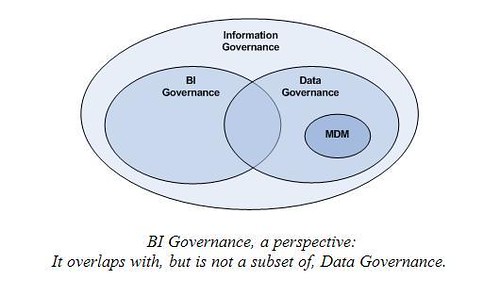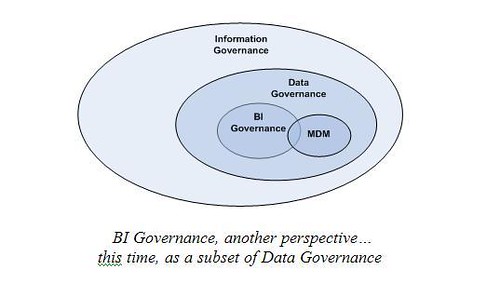For my 100th blog with Intelligent Enterprise, I would like to share some thoughts on BI Governance -- what it is and isn't, and its relationship with information governance, data governance and Master Data Management.

For my 100th blog with IE, I would like to share some thoughts on BI Governance -- what it is and isn't, and its relationship with information governance, data governance and MDM.
Before plunging in, a word of thanks to readers and to Intelligent Enterprise. When IE went from print-and-online to online-only format and editor in chief Doug Henschen approached me to start writing blogs, it took a solid three months for me to wrap my mind around the proposal -- nuances, repercussions and all.As you have probably noticed, IE blogs are not weblogs in the conventional sense -- what George Carlin might have called "technological brain droppings"; they generally pack far more information and insight than the average weblog. Although I obviously have a biased position, I truly believe that these are in the very top-tier of information management blogs you will find anywhere. Doug has collected a very distinguished group of contributors, and it's a privilege to be a part of the group -- and a lot of fun, to boot. Incidentally, I had no idea at that time that my blog "id" might reach three digits -- a classic faux pas from someone who advises on data management!
Anyhow, on to some brain droppings on governance. Here's a classic Venn diagram graphic that tries to put it in a nutshell (or, in this case, four nutshells).
 Note that this is an approximation -- "governance" is many things to many people -- but it captures the essence of the governance relationships.
Note that this is an approximation -- "governance" is many things to many people -- but it captures the essence of the governance relationships.
Information governance is a comprehensive, almost dauntingly grand, concept -- here's the Wikipedia definition, which is as good (or as bad) as any. In essence, information governance is about the management of information along all the dimensions of business (and hence of information): what, how, when, where, who, why (of all these, the "how" is unbelievably loaded).
Information governance includes (but is not limited to) what we conventionally call "business intelligence" (here's the just-about-adequate Wikipedia definition) and data governance (Wikipedia again, this time a little better, but rather strenuous). In essence, data governance leans towards the management of data (along the same dimensions as above) in our "databases" (and there we go off on another tangent of debate on what constitutes a "database"). Managing email archives, for example, is part of information governance, but not typically considered as part of data governance. From a practical standpoint, data governance generally refers to data that comes in through our transactional software applications (sometimes called "structured" data).
Which leads us to master data management (MDM) -- that part of the data in our databases which is "master" or "reference" data. Clearly, MDM is a subset of data governance; to equate the two is a mistake often made. Be warned, though: when an MDM solution vendor makes the "mistake", it could be more of a mischief. MDM solutions aid in data governance... no more and no less.
BI governance is closely related to data governance, but it's not quite the same. Whereas data governance is concerned with all data and the entire data lifecycle -- How and when was it created? How is it architected? Who needs it? How is it being stored? How long is it needed? -- BI governance largely concerns itself with questions like: Who needs information? Where, when and how is the information needed? How can the information be best provisioned? Although it has its roots in structured data, BI is increasingly seeking to include non-structured data in its scope. In short, practically speaking, the focus of BI governance is on information provisioning rather than the information lifecycle.
From one perspective, business intelligence is no more than a means to present data to consumers -- which might make it a subset of data governance, yielding a graphic like this:
 Of course, some might see this as diminishing the value of BI -- after all, shouldn't BI be about information more than data?
Of course, some might see this as diminishing the value of BI -- after all, shouldn't BI be about information more than data?
BI governance is often best implemented without muddying the waters with how it fits in with enterprise information governance. If indeed you happen to have a truly enterprise-level information governance program (and if so, I'd like to hear from you, because you're a rarity), don't worry -- you will find various internal and external pressures nudging the two into an alignment anyway.
There's so much more to write on BI governance -- I feel like I'm just getting warmed up -- but blogs beg for brevity, so it's time to sign off at this point.
Did this confuse more than clarify? Overwhelm you with "quotes" (and parenthesis)? Read a trifle pedagogical? Sorry -- that's the trouble with brain droppings... which, I'm afraid, Wikipedia defines only in the context of George Carlin.
As always, your comments, interpretation and experience, are welcome.For my 100th blog with Intelligent Enterprise, I would like to share some thoughts on BI Governance -- what it is and isn't, and its relationship with information governance, data governance and Master Data Management.
About the Author(s)
You May Also Like







